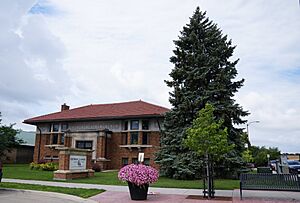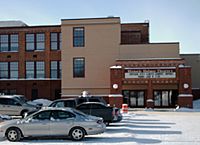Detroit Lakes, Minnesota facts for kids
Quick facts for kids
Detroit Lakes, Minnesota
|
||
|---|---|---|
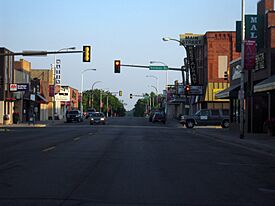
Downtown Detroit Lakes along Washington Avenue
|
||
|
||
| Nickname(s):
"DL"
|
||
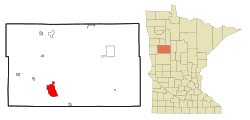
|
||
| Country | United States | |
| State | Minnesota | |
| County | Becker | |
| Founded | 1871 | |
| Incorporated (village) | 1880 | |
| Incorporated (city) | 1900 | |
| Area | ||
| • City | 17.460 sq mi (45.221 km2) | |
| • Land | 11.841 sq mi (30.668 km2) | |
| • Water | 5.619 sq mi (14.554 km2) | |
| Elevation | 1,371 ft (418 m) | |
| Population
(2020)
|
||
| • City | 9,869 | |
| • Estimate
(2023)
|
9,981 | |
| • Density | 848.99/sq mi (327.79/km2) | |
| • Urban | 10,234 | |
| • Metro | 35,283 | |
| Time zone | UTC−6 (Central (CST)) | |
| • Summer (DST) | UTC−5 (CDT) | |
| ZIP Codes |
56501, 56502
|
|
| Area code(s) | 218 | |
| FIPS code | 27-15832 | |
| GNIS feature ID | 0642777 | |
| Sales tax | 7.375% | |
Detroit Lakes is a city in Minnesota, United States. It is the main city of Becker County. In 2020, about 9,869 people lived there. During the summer, the population grows to about 13,000. This is because many tourists and seasonal residents visit.
Major roads like U.S. Highways 10 and 59, and Minnesota State Highway 34 go through the city. Detroit Lakes is about 45 miles east of Fargo–Moorhead. The big city of Minneapolis–Saint Paul is about 205 miles southeast.
Detroit Lakes is a popular spot for fun activities all year. Many tourists and seasonal residents come here. Because of this, tourism is the most important industry in the area.
Contents
- Discovering Detroit Lakes: A City's Journey
- Geography and Climate of Detroit Lakes
- People and Population in Detroit Lakes
- Learning and Education in Detroit Lakes
- Historic Buildings and Places in Detroit Lakes
- Economy and Jobs in Detroit Lakes
- Fun and Recreation in Detroit Lakes
- Culture and Community in Detroit Lakes
- Religion in Detroit Lakes
- Local Media and News
- Transportation in Detroit Lakes
- Famous People from Detroit Lakes
- Images for kids
- See also
Discovering Detroit Lakes: A City's Journey
The Early Days of Detroit Lakes
The city of Detroit Lakes was started by Colonel George Johnston in 1871. Its name has been Detroit Lakes since 1927. This change helped avoid confusion with Detroit, Michigan. Before that, it was just called Detroit.
The name "Détroit" comes from French. It means "strait" or "narrows." This refers to a sand bar that separated Big Detroit Lake from Little Detroit Lake. This sand bar was later dug out. This made it possible for steamboats to travel through the Pelican River area.
Detroit Lakes was also a stop on the Red River Trails. These were paths used by oxcarts long ago. The Ojibwe people called Detroit Lakes "Gaiajawangag." This means "a lake with a crossing in a sandy place."
Growth and Development of the City
The city quickly grew when the Northern Pacific Railroad was built. In 1877, Detroit (as it was called then) was chosen to be the county seat. This means it became the main city for the county. Detroit won by a large vote. Other nearby cities like Frazee, Lake Park, and Audubon also wanted to be the county seat.
By 1884, Detroit Lakes had many businesses. These included hotels, a bank, a newspaper, and even an opera house. The first county courthouse was also built that year. Some old buildings are still standing today. These include the 1908 railroad station and the historic Holmes Theater. You can learn more about the city's past at the Becker County Museum. It is located near the Holmes Theater.
Geography and Climate of Detroit Lakes
Where is Detroit Lakes Located?
Detroit Lakes covers an area of about 17.46 square miles (45.22 square kilometers). About 11.84 square miles (30.67 square kilometers) is land. The rest, about 5.62 square miles (14.55 square kilometers), is water. The city is known for its beautiful Detroit Lake.
Weather in Detroit Lakes: Hot Summers, Cold Winters
Detroit Lakes has a climate with warm summers and very cold winters.
| Climate data for Detroit Lakes, Minnesota (1991–2020 normals, extremes 1895–present) | |||||||||||||
|---|---|---|---|---|---|---|---|---|---|---|---|---|---|
| Month | Jan | Feb | Mar | Apr | May | Jun | Jul | Aug | Sep | Oct | Nov | Dec | Year |
| Record high °F (°C) | 55 (13) |
59 (15) |
77 (25) |
95 (35) |
97 (36) |
100 (38) |
110 (43) |
105 (41) |
100 (38) |
91 (33) |
75 (24) |
60 (16) |
110 (43) |
| Mean maximum °F (°C) | 39.4 (4.1) |
37.6 (3.1) |
51.0 (10.6) |
72.1 (22.3) |
80.4 (26.9) |
85.5 (29.7) |
95.7 (35.4) |
90.8 (32.7) |
77.1 (25.1) |
71.7 (22.1) |
55.9 (13.3) |
35.4 (1.9) |
95.7 (35.4) |
| Mean daily maximum °F (°C) | 17.2 (−8.2) |
22.7 (−5.2) |
35.5 (1.9) |
52.0 (11.1) |
66.4 (19.1) |
75.5 (24.2) |
79.2 (26.2) |
77.7 (25.4) |
69.5 (20.8) |
53.1 (11.7) |
36.7 (2.6) |
22.4 (−5.3) |
50.7 (10.4) |
| Daily mean °F (°C) | 6.8 (−14.0) |
11.5 (−11.4) |
25.4 (−3.7) |
40.6 (4.8) |
54.4 (12.4) |
64.3 (17.9) |
68.3 (20.2) |
66.5 (19.2) |
57.9 (14.4) |
43.3 (6.3) |
27.9 (−2.3) |
14.0 (−10.0) |
40.1 (4.5) |
| Mean daily minimum °F (°C) | −3.6 (−19.8) |
0.2 (−17.7) |
15.4 (−9.2) |
29.1 (−1.6) |
42.4 (5.8) |
53.1 (11.7) |
57.5 (14.2) |
55.3 (12.9) |
46.3 (7.9) |
33.5 (0.8) |
19.2 (−7.1) |
5.6 (−14.7) |
29.5 (−1.4) |
| Mean minimum °F (°C) | −24.6 (−31.4) |
−19.4 (−28.6) |
−13.7 (−25.4) |
13.5 (−10.3) |
30.2 (−1.0) |
42.3 (5.7) |
47.1 (8.4) |
41.5 (5.3) |
31.9 (−0.1) |
18.4 (−7.6) |
−6.5 (−21.4) |
−18.2 (−27.9) |
−24.6 (−31.4) |
| Record low °F (°C) | −44 (−42) |
−45 (−43) |
−35 (−37) |
−12 (−24) |
15 (−9) |
28 (−2) |
33 (1) |
31 (−1) |
15 (−9) |
−10 (−23) |
−32 (−36) |
−48 (−44) |
−48 (−44) |
| Average precipitation inches (mm) | 0.82 (21) |
0.66 (17) |
0.96 (24) |
2.03 (52) |
3.73 (95) |
4.90 (124) |
4.35 (110) |
3.26 (83) |
3.55 (90) |
2.84 (72) |
1.37 (35) |
0.98 (25) |
29.45 (748) |
| Average precipitation days | 6.2 | 7.2 | 7.1 | 7.8 | 11.9 | 13.1 | 10.9 | 9.2 | 10.2 | 9.6 | 7.2 | 9.4 | 109.8 |
| Source: NOAA | |||||||||||||
People and Population in Detroit Lakes
How Many People Live Here?
| Historical population | |||
|---|---|---|---|
| Census | Pop. | %± | |
| 1880 | 554 | — | |
| 1890 | 1,510 | 172.6% | |
| 1900 | 2,060 | 36.4% | |
| 1910 | 2,807 | 36.3% | |
| 1920 | 3,426 | 22.1% | |
| 1930 | 3,675 | 7.3% | |
| 1940 | 5,015 | 36.5% | |
| 1950 | 5,787 | 15.4% | |
| 1960 | 5,633 | −2.7% | |
| 1970 | 5,797 | 2.9% | |
| 1980 | 7,106 | 22.6% | |
| 1990 | 6,635 | −6.6% | |
| 2000 | 7,348 | 10.7% | |
| 2010 | 8,569 | 16.6% | |
| 2020 | 9,869 | 15.2% | |
| 2023 (est.) | 9,981 | 16.5% | |
| U.S. Decennial Census 2020 Census |
|||
The population of Detroit Lakes has grown steadily over the years. In 2020, there were 9,869 people living in the city. The city has about 4,462 households.
Who Lives in Detroit Lakes?
| Race / ethnicity (NH = non-Hispanic) | Pop. 2000 | Pop. 2010 | Pop. 2020 | % 2000 | % 2010 | % 2020 |
|---|---|---|---|---|---|---|
| White alone (NH) | 6,723 | 7,701 | 8,331 | 84.4% | ||
| Black or African American alone (NH) | 29 | 57 | 124 | 1.3% | ||
| Native American or Alaska Native alone (NH) | 325 | 359 | 393 | 4.0% | ||
| Asian alone (NH) | 39 | 67 | 98 | 1.0% | ||
| Pacific Islander alone (NH) | 1 | 5 | 4 | 0.0% | 0.0% | 0.0% |
| Other race alone (NH) | 9 | 10 | 34 | 0.3% | ||
| Mixed race or multiracial (NH) | 134 | 230 | 646 | 6.5% | ||
| Hispanic or Latino (any race) | 88 | 140 | 239 | 1.2% | 1.6% | 2.4% |
| Total | 7,348 | 8,569 | 9,869 | 100.0% | 100.0% | 100.0% |
In 2020, most people in Detroit Lakes were White (85.2%). There were also people who identified as African American (1.3%), Native American (4.2%), and Asian (1.0%). About 2.4% of the population was Hispanic or Latino.
About 23.2% of residents were under 18 years old. The median age in the city was 40.2 years. This means half the people were older than 40.2 and half were younger.
Many households own their homes (59.3%). The median household income was $60,317 in 2022. About 10.9% of the city's population lived at or below the poverty line. Most adults (93.8%) have a high school diploma. Many also have a bachelor's degree or higher (32.2%).
The main backgrounds of people in Detroit Lakes include German (35.8%) and Norwegian (25.5%). Other backgrounds include Irish (8.6%) and English (4.3%).
Learning and Education in Detroit Lakes
Colleges and Higher Learning
The Minnesota State Community and Technical College has a campus in Detroit Lakes. It is on Minnesota Highway 34. About 650 students attend this campus. They can choose from 25 different study programs. The college offers both in-person and online classes.
Schools for Kids (K-12)
Detroit Lakes has several schools for students from kindergarten to 12th grade:
- Rossman Elementary School (K–5)
- Roosevelt Elementary School (K–5)
- Detroit Lakes Middle School (6–8)
- Detroit Lakes High School (9–12)
- Lakes Area Learning Center Alternative High School (ALC) (9–12)
There are also private schools:
- Holy Rosary Catholic School (K–8)
- Faith Christian School (K–8)
- Adventist Christian School (K–8)
The Historic Carnegie Library
The Detroit Lakes Public Library was built in 1913. It received a $10,000 grant from Andrew Carnegie. It is part of the Lake Agassiz Regional Library Network. The building is on the National Register of Historic Places. It has a special design called the Prairie School architectural style. This style was made popular by architects like Louis Sullivan and Frank Lloyd Wright. The library has a unique orange clay-tiled roof. In 1985, the library was made bigger to add more space.
Historic Buildings and Places in Detroit Lakes
Many buildings and structures in Detroit Lakes are listed on the National Register of Historic Places. This means they are important historical sites.
- The Detroit Lakes Carnegie Library was added in 1976. It shows the Prairie School architectural style.
- The Graystone Hotel was added in 1999.
-
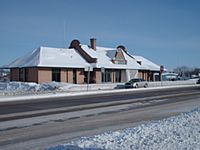 Historic Detroit Lakes Amtrak Depot in winter
Historic Detroit Lakes Amtrak Depot in winter - The Amtrak Depot (train station) was added in 1988. It used to be the Northern Pacific Passenger Depot. Today, it is a small shop and eatery.
- The Homer E. Sargent House is a private home. It has the Queen Anne architectural style. It was added to the Register in 1988.
- The Edgewater Beach Cottages, also known as Stovewood Cottages, were added in 1989.
- The Fairyland Cottages Historic District was added in 1989.
- The Holmes Block (also called the Opera House Block) includes several downtown buildings. It was added to the National Register in 2001.
Economy and Jobs in Detroit Lakes
How Detroit Lakes Makes Money
The city's economy mostly depends on summer tourism. When more people visit, the city's businesses do better. There are many health care services, stores, and other businesses for both locals and tourists.
Detroit Lakes has about 15 hotels. Many resorts in the area offer even more places to stay. Downtown, there is a large shopping center called Washington Square Mall. Newer chain stores and restaurants are mostly found along Highways 10 and 59.
The city also has businesses that help tourists have fun. These include sporting goods stores, amusement parks, and river tubing companies. Detroit Lakes also has two industrial parks. These are home to many manufacturing businesses.
Top Employers in the City
Here are some of the biggest employers in Detroit Lakes:
| # | Employer | Type of Business | # of Employees | Percentage |
|---|---|---|---|---|
| 1 | Essentia Health/St. Mary's Hospital | Health Care | 862 | 4.4% |
| 2 | Detroit Lakes Public Schools ISD #22 | Education | 625 | 3.2% |
| 3 | Lakeshirts Screen Printing | Shirt Screen Printing | 527 | 2.7% |
| 4 | BTD Manufacturing | Metal Stamping | 485 | 2.5% |
| 5 | Walmart | Retail Store | 369 | 1.9% |
| 6 | Becker County | Government | 357 | 1.8% |
| 7 | Minnesota Department of Transportation | Highway Maintenance | 270 | 1.4% |
| 8 | Ecumen | Nursing Home & Assisted Living | 202 | 1.0% |
| 9 | SJ Electro Systems | Manufacturing | 195 | 1.0% |
| 10 | Menards | Retail Store | 159 | 0.8% |
| — | Total employers | — | 4,051 | 20.9% |
Fun and Recreation in Detroit Lakes
Detroit Lakes is a great place for outdoor activities. Many lakes are used for fishing, boating, and swimming. Detroit Lake is the most popular. It has a mile-long city beach. This beach is where the city's Independence Day fireworks show happens every year.
There are 14 golf courses in and around Detroit Lakes. You can also find an amusement park, a paintball arena, and places for river tubing. The city hosts the annual Becker County Fair. The Shrine Circus also performs here each year.
In winter, people enjoy ice fishing, snowmobiling, and cross-country skiing. You can also go downhill skiing and snowboarding at the Detroit Mountain Recreation Area. The city has a special park dedicated to the Grand Army of the Republic.
Culture and Community in Detroit Lakes
The Historic Holmes Theatre
The Historic Holmes Theatre is a beautiful Art Deco theater. It has been recently updated. It is part of the Detroit Lakes Community and Cultural Center. The theater hosts music, drama, and dance shows all year. It can seat almost 1,000 people. You can see many professional shows here. Local groups also perform, and events like weddings are held.
Music Festivals and Events
Since 1983, Detroit Lakes has hosted WE Fest every August. This is a very popular country music festival. People camp out around a big stage. The three-day concert brings about 50,000 music fans each summer. In 2007, a record 83,000 people attended. The festival takes place at the Soo Pass Ranch, south of Detroit Lakes.
Another music festival, the 10,000 Lakes Festival, used to be held here in July. However, it stopped in 2009.
Community & Cultural Center
Detroit Lakes has a modern Community & Cultural Center. It includes a new fitness center. It also has the renovated Holmes School building. The fitness area has an 8-lane Olympic-sized pool. There is an indoor track, basketball courts, a weight room, and racquetball courts.
The old 1931 school building now holds the 837-seat Historic Holmes Theatre. It also has conference rooms. This large center was completed in 2001.
Religion in Detroit Lakes
Detroit Lakes has many Christian churches. Most of them are Lutheran churches. There is also a Roman Catholic church (Holy Rosary Church). Other churches include Episcopal, United Methodist, Assemblies of God, United Church of Christ, Mennonite, The Church of Jesus Christ of Latter-day Saints, Jehovah's Witnesses, Seventh-day Adventist Church, and Community Alliance Church. There is also an interdenominational Christian Fellowship Church. Currently, there are no places of worship for other religions in Detroit Lakes.
Local Media and News
Radio Stations
Detroit Lakes has many FM radio stations. They play different types of music and programs.
| FM radio stations | ||||
|---|---|---|---|---|
| Frequency | Call sign | Name | Format | Owner |
| 88.1 FM | KAWD (LPFM) | LPFM | Religious | Christian Media, Inc, |
| 89.1 FM | KNNZ | 89.1 Ken's FM | Adult Contemporary | Pioneer Public Broadcasting Company, Inc |
| 89.9 FM | KKWE | Niijii Radio | Variety | White Earth Land Recovery Project |
| 90.3 FM | KCCD | MPR | Public Radio | Minnesota Public Radio |
| 91.1 FM | KCCM | MPR | Classical | Minnesota Public Radio |
| 93.1 FM | K226CA KDLM-AM | KDLM | Adult Contemporary | Leighton Broadcasting |
| 94.5 FM | KDLB | Bob FM | Country | Radio Fargo-Moorhead, Inc. |
| 95.1 FM | KBVB | Bob FM | Country | Radio Fargo-Moorhead, Inc. |
| 96.5 FM | KJJK | Kj Country 96.5 FM | Country | Leighton Radio Holdings, Inc. |
| 97.5 FM | KDKK | Star Station - Music of Life | Nostalgia | Ec Broadcasting |
| 98.7 FM | KLTA | Big 98.7 | Hot Adult Contemporary | Radio Fargo-Moorhead, Inc. |
| 99.5 FM | KPRW | The Lakes 99.5 | Hot Adult Contemporary | Leighton Radio Holdings, Inc. |
| 99.9 FM | KVOX | Froggy 99.9 | Country | Midwest Communications, Inc. |
| 102.3 FM | KRCQ | Real Country 102 | Country | Leighton Enterprises, Inc. |
| 103.3 FM | KZCR | Z 103.3 | Classic Rock | Leighton Radio Holdings, Inc. |
| 104.1 FM | KBOT | Wave 104.1 | Adult Contemporary | Leighton Enterprises, Inc. |
| 105.1 FM | KQWB | Q105.1 Rocks | Rock | Radio Fargo-Moorhead, Inc. |
| 105.9 FM | KKWS | Superstation K106 | Country | HBI Radio Brainerd/Wadena, LLC |
| 106.5 FM | KRJB | Your Sports Channel | Sports | R&J Broadcasting, Inc. |
| 106.9 FM | KEGK | 106.9 The Eagle | Classic Hits | Radio Wahpeton Breckenridge, LLC |
| 107.9 FM | KPFX | The Fox | Classic Rock | Radio Fargo-Moorhead, Inc. |
Television and Newspapers
- TV3: Lakes Area Television is a local cable TV station. It broadcasts news and local programs for the area.
- The Detroit Lakes Tribune is a newspaper published twice a week.
- The Forum of Fargo-Moorhead is a daily newspaper. It covers news from Fargo–Moorhead and parts of Minnesota and North Dakota.
- White Earth - Anishinaabeg Today is another local publication.
Transportation in Detroit Lakes
You can travel to and from Detroit Lakes in several ways:
- Amtrak Empire Builder: This train stops daily at the Detroit Lakes' Amtrak station.
- Jefferson Lines Intercity Bus Line: This bus service connects Detroit Lakes to other cities.
- Detroit Lakes Airport: The city also has its own airport.
Famous People from Detroit Lakes
Many notable people have connections to Detroit Lakes:
- Tillie Anderson: A famous bicycle racer from the 1890s.
- Dick Beardsley: A marathon runner and speaker. He was the third-fastest American-born male marathon runner.
- Jason Blake: A retired NHL ice hockey player.
- James Evans: A Minnesota state legislator.
- Mary Evelyn Fredenburg: A nurse missionary born in Detroit Lakes.
- Phil Hansen: A retired NFL player for the Buffalo Bills.
- Jessica Lange: An Oscar-winning actress who briefly attended high school here.
- Collin Peterson: A former Congressman and chair of the House Agriculture Committee.
- Dennis Poppenhagen: A Minnesota state legislator and businessman.
- Dave Reichert: A former Congressman from Washington.
- Ed Schultz: A former talk radio host and news anchor.
- Caroline Smith: A musician and singer/songwriter.
- Adam Thielen: A wide receiver for the Carolina Panthers in the National Football League.
- Loren P. Thompson: A Minnesota state legislator.
- Harriet Hilreth Weeks: A Minnesota state legislator.
Images for kids
See also
 In Spanish: Detroit Lakes (Minnesota) para niños
In Spanish: Detroit Lakes (Minnesota) para niños



